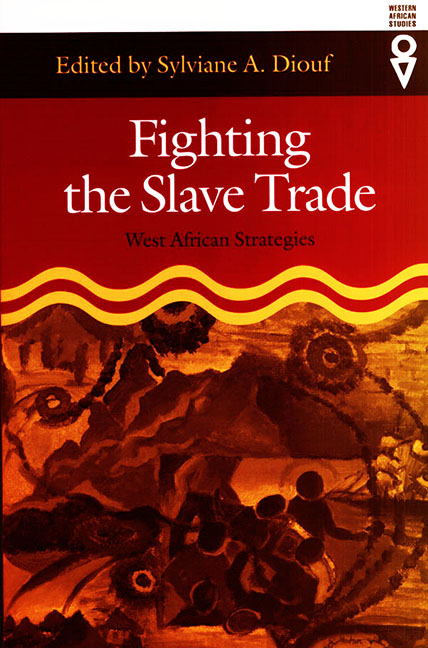Book contents
- Frontmatter
- Contents
- Preface
- Introduction
- PART 1 DEFENSIVE STRATEGIES
- 1 Lacustrine Villages in South Benin as Refuges from the Slave Trade
- 2 Slave-Raiding and Defensive Systems South of Lake Chad from the Sixteenth to the Nineteenth Century
- 3 The Myth of Inevitability and Invincibility: Resistance to Slavers and the Slave Trade in Central Africa, 1850–1910
- 4 The Impact of the Slave Trade on Cayor and Baol: Mutations in Habitat and Land Occupancy
- 5 Defensive Strategies: Wasulu, Masina, and the Slave Trade
- PART 2 PROTECTIVE STRATEGIES
- PART 3 OFFENSIVE STRATEGIES
- Epilogue: Memory as Resistance: Identity and the Contested History of Slavery in Southeastern Nigeria, an Oral History Project
- Contributors
- Index
2 - Slave-Raiding and Defensive Systems South of Lake Chad from the Sixteenth to the Nineteenth Century
from PART 1 - DEFENSIVE STRATEGIES
Published online by Cambridge University Press: 30 August 2017
- Frontmatter
- Contents
- Preface
- Introduction
- PART 1 DEFENSIVE STRATEGIES
- 1 Lacustrine Villages in South Benin as Refuges from the Slave Trade
- 2 Slave-Raiding and Defensive Systems South of Lake Chad from the Sixteenth to the Nineteenth Century
- 3 The Myth of Inevitability and Invincibility: Resistance to Slavers and the Slave Trade in Central Africa, 1850–1910
- 4 The Impact of the Slave Trade on Cayor and Baol: Mutations in Habitat and Land Occupancy
- 5 Defensive Strategies: Wasulu, Masina, and the Slave Trade
- PART 2 PROTECTIVE STRATEGIES
- PART 3 OFFENSIVE STRATEGIES
- Epilogue: Memory as Resistance: Identity and the Contested History of Slavery in Southeastern Nigeria, an Oral History Project
- Contributors
- Index
Summary
BETWEEN THE SIXTEENTH CENTURY and the close of the nineteenth, the outskirts of Lake Chad were characterized by long-standing violence. This situation was due to the polities of central Sudan, situated at the crossroads of important trade routes across the Sahara, which led violent conquests and slave raids. It was particularly the case of the Bornu Empire, the kingdom of Bagirmi, and the Fulani emirate of Adamawa. After a long economic crisis and internal conflicts, a new era opened for Bornu during the reign of Mai Ali Gaji (1470–1503). The new era was characterized by the building of a new capital, Birni Ngazargamu, protected by strong fortifications. Yet it was under Idris Alaoma that Bornu turned itself into a political, economic, and military power. His first twelve years were characterized by the intensification of the slave trade, in connection with the numerous military campaigns he led near the outskirts of Lake Chad and beyond, to Mount Mandara. Bornu's military supremacy was essentially based on the use of cavalry and firearms supplied by the Ottoman Empire, in exchange for cohorts of slaves driven through the Sahara. Bagirmi, located on the west bank of the Chari River, had consistently shown its intention to be politically autonomous from its two powerful neighbors, Bornu and Ouadday. The quest for and the supply of slaves were a major preoccupation in Bagirmi (Deschamps 1971, 168).
As soon as news of the jihad launched by Usman dan Fodio reached the Fulani emirate of Adamawa, several leaders left for Sokoto. There, dan Fodio appointed Modibbo Adama lieutenant. He was invested with full authority in 1809 and received the banner of the jihad with orders to spread Islam all over Fombinaland. Adama established a strong army and drew his inspiration from the tactics, strategy, and armaments of Bornu. Instructors came from the Maghreb and the Ottoman Empire to drill some units (Bah 1982). The spearhead was undoubtedly the cavalry, with cuirassed horses and coats of mail. Led by Modibbo Adama and his successors, military campaigns intensified. From the mid-nineteenth century, the Fulani were the masters of a large geographical area that stretched from the outskirts of Lake Chad to the edge of the equatorial forest. This territory became an emirate and was given the name Adamawa.
- Type
- Chapter
- Information
- Fighting the Slave TradeWest African Strategies, pp. 15 - 30Publisher: Boydell & BrewerPrint publication year: 2004



